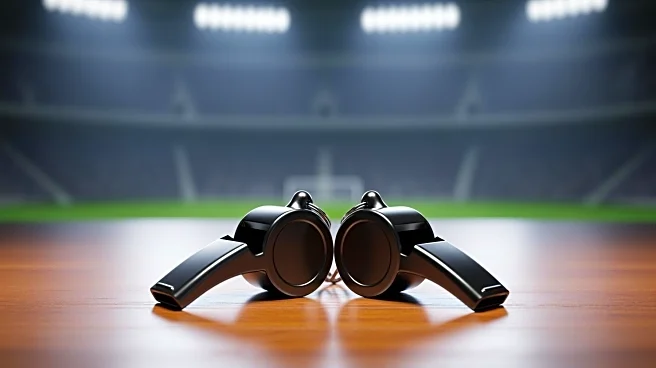What's Happening?
Barcelona head coach Hansi Flick will not be present for the upcoming El Clasico against Real Madrid due to a one-game touchline ban. The ban was imposed following Flick's red card during Barcelona's 2-1
victory over Girona, where he was penalized for sarcastically applauding the referee's decision and making an obscene gesture. Despite Barcelona's intention to appeal the decision, the club is not optimistic about overturning the ban. Marcus Sorg, Flick's long-serving assistant, will take over coaching duties for the match at the Estadio Santiago Bernabeu. Flick's absence means he cannot participate in pre or post-match press duties or communicate with his team during the game.
Why It's Important?
Flick's suspension is significant as it impacts Barcelona's strategy in one of the most crucial matches of the season against their arch-rivals, Real Madrid. The El Clasico is not only a high-stakes game in terms of league standings but also a cultural event with global viewership. Flick's absence could affect Barcelona's performance, given his successful track record against Real Madrid, including a trophy treble in his debut season. The decision also highlights the strict disciplinary measures in La Liga, emphasizing the importance of sportsmanship and conduct among coaches and players.
What's Next?
Barcelona's appeal against Flick's ban will be heard by the La Liga Disciplinary Committee, with an update expected 48 hours before the match. The outcome of the appeal could influence Barcelona's preparation and strategy for the game. Meanwhile, Marcus Sorg will prepare to lead the team, potentially adjusting tactics to compensate for Flick's absence. The match's result could have significant implications for the league standings, with Real Madrid currently leading by two points.
Beyond the Headlines
Flick's ban raises questions about the pressure and expectations placed on coaches in high-profile matches. It also underscores the importance of maintaining professionalism and composure, even in tense situations. The incident may prompt discussions on the role of emotional intelligence in sports leadership and the impact of disciplinary actions on team morale and performance.









